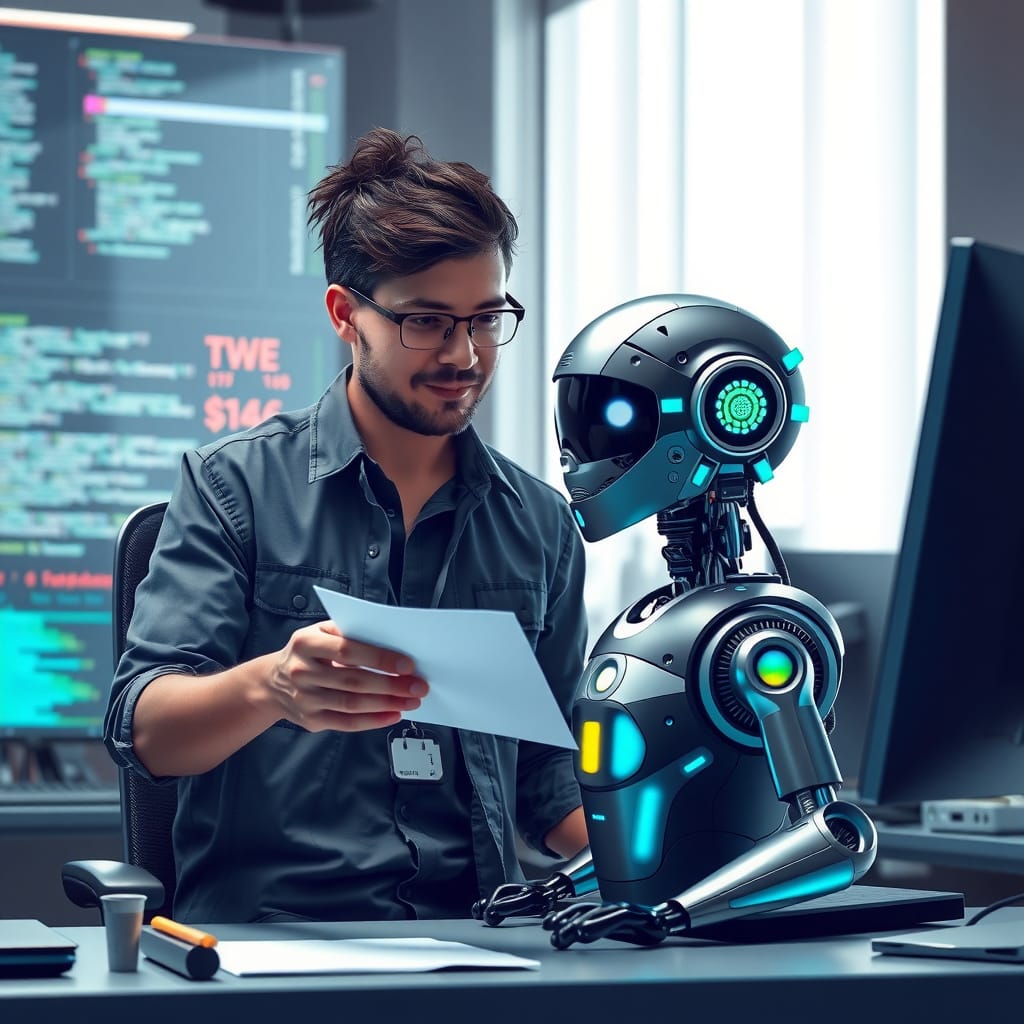In what future tech historians will surely describe as the most predictable tech extinction since Blockbuster faced Netflix, Stack Overflow — the hallowed digital monastery where software programmers once gathered to both solve and create new programming problems—is quietly vanishing into the digital ether, leaving behind only the fading echo of “this question has been marked as duplicate” notifications.
Recent data reveals that Stack Overflow’s question volume has plummeted faster than a tech CEO’s principles during a US congressional hearing, with a devastating 25% reduction in user activity within just six months of ChatGPT’s release.1 What began as a slow decline in mid-2020 has accelerated into what data scientist Theodore R. Smith, a top 1% Stack Overflow contributor, diplomatically calls an “alarming” drop in questions that continues into 2025.2
The Digital Murder Mystery Nobody Is Investigating
The prime suspect in this crime against developer community resources? AI coding assistants like GitHub Copilot, ChatGPT, and their increasingly smug algorithmic cousins who’ve never experienced the character-building trauma of being downvoted into oblivion for forgetting to use a semicolon.
“I haven’t opened Stack Overflow in months,” confessed one software developer on a Discord channel, where such admissions are becoming as common as “thoughts and prayers” tweets after a tech platform outage. The evidence is clear: developers are ghosting the platform that once served as their collective brain, preferring instead the instant gratification of AI assistants that never tell them to “Google harder” before answering.3
The irony hasn’t been lost on keen observers—these AI assistants were trained on the very knowledge base they’re now helping to destroy. It’s the digital equivalent of a child eating its parent, if that parent were composed entirely of JavaScript solutions and heated debates about tabs versus spaces.
The Autopsy Results Are In: Death By Convenience
What killed Stack Overflow wasn’t just ChatGPT’s uncanny ability to generate solutions faster than a human can type “How do I center a div?” It was the culmination of forces that were years in the making.
Stack Overflow’s notorious community tone—where newcomers faced a gauntlet of criticism that made Marine boot camp look like a pre-school graduation—certainly played its part. As one former user eloquently described it, “Stack Overflow’s community is the reason I stopped asking questions,” presumably before adding “also, the existential dread of realizing I’ll never truly understand regular expressions.”
By 2023, approximately 36% of developers were actively using AI assistants to understand coding errors and generate fixes.4 Fast forward to 2024, and that number skyrocketed to 63% of professionals incorporating AI into their regular workflows.5 Now, in our glorious 2025, industry analysts project that AI assistants will write as much as 90% of software code within a year—a statistic that should terrify anyone who has ever received an “I’ll fix it in the morning” Slack message from a developer.
The Promised Productivity Paradise
The tech industry’s love affair with AI coding assistants is fueled by impressive-sounding statistics that executives can’t wait to share during quarterly earnings calls. Research suggests that AI adoption provides a stunning 15-33% productivity improvement via successful pull requests.6 According to the DORA report, a 25% increase in AI adoption is linked to a respectable 2.1% rise in productivity, which is coincidentally the exact percentage increase in executive bonuses for implementing AI solutions.7
Microsoft, keen to remind everyone they’re not just about forced Windows updates anymore, reported that 77,000 organizations have adopted GitHub Copilot since its release in October 2021.8 Meanwhile, Y Combinator’s managing partner, Jared Friedman, revealed that a quarter of startups in their current cohort have codebases that are “almost entirely AI-generated,” which explains why they all seem to be solving the same three problems.
The Glorious Age of Copy-Pasta Engineering
Today’s modern developer workflow has evolved from “search Stack Overflow, copy code, modify slightly, pretend you wrote it” to the much more efficient “ask AI assistant, copy code, don’t bother understanding it, ship to production.” Progress, ladies and gentlemen!
Simon Lau, an engineering manager at ChargeLab, summed up the industry’s FOMO-driven adoption perfectly: “AI is something that helps us, and it is also helping our competitor as well, right? So if we are not utilizing this, we are not leveling the playing field with our competitor.” This profound statement captures the essence of modern tech strategy: do it because everyone else is, regardless of whether it makes sense, like wearing Allbirds to a VC meeting in 2019.
The benefits extend beyond mere productivity. Developers using AI tools reported improvements in “flow” (+2.6%), which is corporate-speak for “staring at the screen while the machine does the work,” and “job satisfaction” (+2.2%), likely due to having more time to perfect their coffee brewing techniques. Most impressively, they claim a 3.4% improvement in code quality, a statistic that conveniently ignores the 41% increase in bugs found in AI-generated code.
The Cannibal That Starves Itself
In the most delicious irony since Facebook became Meta about its own toxicity, AI coding assistants are devouring the very data sources that make them intelligent. As Stack Overflow questions decrease, the training data for future AI models diminishes, creating what ML engineer Ayhan Fuat Çelik eloquently calls “The Fall of Stack Overflow.”9
“With fewer questions about current programming problems being asked on the public internet, the training data for the coding assistants of tomorrow gets reduced,” explains one AI researcher, apparently unaware of the existential paradox this presents. “Ironically, the AI coding assistants of today are one of the main reasons for the fall of Stack Overflow and why people ask their questions in private to an AI.”
This creates a fascinating scenario where future AI models may need to be trained on the outputs of current AI models—a practice experts warn risks “model collapse,” where errors accumulate over generations, resulting in nonsensical outputs. It’s like a digital version of royal in-breeding, but instead of Habsburg jaws, we get AI that suggests putting your database credentials directly in your GitHub repository.
The Most Endangered Programming Species
Not all programming topics have suffered equally in this AI-driven extinction event. According to detailed analysis, questions about fundamental programming concepts (lists, dictionaries, loops) and data analysis tools (pandas, dataframes, SQL) have experienced the most significant declines.10
Meanwhile, topics related to operating systems and certain development frameworks like Next.js, .NET, and Azure have seen comparatively smaller decreases. This suggests that AI is better at handling straightforward coding tasks but still struggles with more complex, context-dependent challenges—much like entry-level developers after a three-month bootcamp who list “proficient in AI prompt engineering” on their LinkedIn profiles.
The Future: Hand-Coding Goes Artisanal
As we look toward 2040 and beyond, when researchers predict AI will fully replace software developers, one can’t help but imagine a dystopian future where writing code manually becomes an artisanal craft, like churning your own butter or using a paper map.11
“I hand-code all my functions,” a hipster developer will say in 2035, adjusting their analog smartwatch. “The machines don’t understand the soul of a well-crafted recursive algorithm. Also, I don’t trust them after the Great Stack Overflow Knowledge Gap of 2028.”
Indeed, nearly 30% of software developers surveyed already believe their development efforts will be replaced by artificial intelligence in the foreseeable future. The remaining 70% were presumably too busy fixing AI-generated bugs to respond to the TechOnion survey.
The Developer Identity Crisis
Perhaps the most profound impact of this shift is psychological. For decades, developers have defined themselves by their ability to solve complex problems through code. Stack Overflow provided not just answers but a community and status system where reputation points served as a measure of one’s worth—the programmer’s equivalent of TikTok likes.
Now, as AI assistants eliminate the need to personally understand how code works, software developers find themselves in an existential crisis. “Am I still a developer if I’m just telling AI what to build?” asks one senior engineer on Reddit, before quietly updating his LinkedIn profile to “AI Workflow Optimization Specialist.”
This crisis extends to companies mandating AI tool usage without understanding their limitations. As one anonymous developer put it: “Under pressure to embrace AI, developers are growing frustrated by misguided mandates and are left to clean up any collateral damage”. In other words, executives want the 33% productivity gain but don’t want to hear about the 41% increase in bugs that comes with it.
The Vicious Circle of Knowledge Extinction
The most alarming aspect of Stack Overflow’s decline is how it creates a vicious cycle: fewer questions means less current knowledge being shared publicly, which means future AI models will be trained on increasingly outdated information. This, in turn, will produce AI assistants that generate obsolete code, forcing developers back to… well, not Stack Overflow, because it will be a digital ghost town populated only by bots asking each other about jQuery solutions in 2030.
Stack Overflow’s own 2024 insights admitted: “More people are reading than contributing,” which is a polite way of saying “developers are done engaging”.12 It’s like a digital version of the tragedy of the commons, where everyone wants to benefit from community knowledge but nobody wants to contribute to it—especially when they can just ask ChatGPT-5 instead.
So what happens when all the smart humans stop sharing their knowledge publicly? When the next generation of programming languages and frameworks emerges, will there be enough human-generated solutions to train AI on? Or will we enter a dark age of programming where AI assistants confidently generate solutions that worked great in 2018 but are hopelessly obsolete for the challenges of 2030?
As we stand at this technological crossroads, one thing is clear: the developers who can still solve problems without AI assistance will be the digital wilderness guides of tomorrow—rare, valuable, and probably sporting magnificent beards while charging astronomical consulting rates that make current cloud computing costs look like pocket change.
So what do you think? Are you mourning the slow death of Stack Overflow, or celebrating your liberation from snarky comments about your “poorly formatted question”? Has your relationship with AI coding assistants evolved from skepticism to dependency? Share your existential coding crisis in the comments below—if you can still formulate a coherent thought without asking an AI assistant to generate it for you.
Enjoyed this dose of uncomfortable truth? This article is just one layer of the onion.
My new book, “The Subtle Art of Not Giving a Prompt,” is the definitive survival manual for the AI age. It’s a guide to thriving in a world of intelligent machines by first admitting everything you fear is wrong (and probably your fault).
If you want to stop panicking about AI and start using it as a tool for your own liberation, this is the book you need. Or you can listen to the audiobook for free on YouTube.
>> Get your copy now (eBook & Paperback available) <<
References
- https://www.inet.ox.ac.uk/news/new-study-reveals-impact-of-chatgpt-on-public-knowledge-sharing ↩︎
- https://www.ericholscher.com/blog/2025/jan/21/stack-overflows-decline/ ↩︎
- https://dev.to/abdulbasithh/why-devs-are-quietly-leaving-stack-overflow-in-2025-368d ↩︎
- https://techwings.com/blog/the-rise-of-ai-coding-assistants ↩︎
- https://techwings.com/blog/the-rise-of-ai-coding-assistants ↩︎
- https://www.turing.com/resources/llm-coding-assistants-increase-software-development-productivity ↩︎
- https://axify.io/blog/use-ai-for-developer-productivity ↩︎
- https://leaddev.com/culture/ai-coding-mandates-are-driving-developers-to-the-brink ↩︎
- https://pumpingco.de/blog/with-the-fall-of-stack-overflow-ai-coding-assistants-like-github-copilot-will-have-a-data-problem/ ↩︎
- https://tomazweiss.github.io/blog/stackoverflow_decline/ ↩︎
- https://brainhub.eu/library/software-developer-age-of-ai ↩︎
- https://dev.to/abdulbasithh/why-devs-are-quietly-leaving-stack-overflow-in-2025-368d ↩︎





GIPHY App Key not set. Please check settings